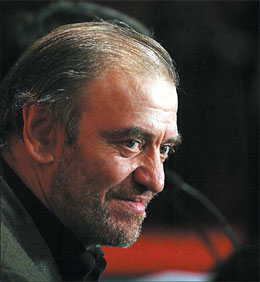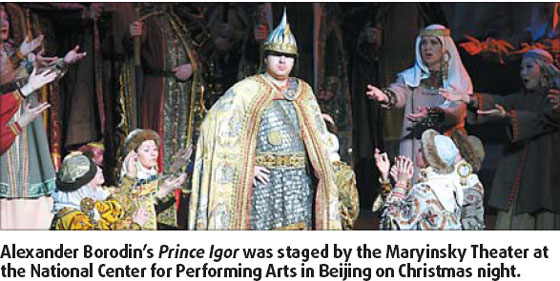Valery Gergiev, leading performer of the Maryinsky Theater, has become the first foreign artist to climb atop the podium of the National Center for Performing Arts (NCPA), also known as the Grand National Theater, adding to the fanfare of the opening of the giant egg-shaped venue.
On Christmas night, Gergiev conducted a performance of Borodin's Prince Igor to an enthusiastic audience. The current run, which also includes Swan Lake and two other repertory pieces by Kirov Ballet, will run until January 6.
This is the biggest overseas performing arts company to grace a stage in China, comprising some 510 people, said Zhang Yu, general manager of China Arts and Entertainment Group. There are 60 ballet dancers for the opening alone.
Maryinsky Theater conductor Valery Gergiev.Photos by Jiang Dong.
Zhao Ruheng, artistic director for NCPA, hailed the occasion as "an artistic feast which we've been waiting years for". She further explained why a Russian company was chosen for the coveted role: "We are the first generation of artists in New China and we were all trained by Soviet teachers. What we see now is a textbook case of Russian artistic excellence that we were brought up with. To us, this is like a festival."
Gergiev returned the courtesy by canceling a previous engagement with New York's Metropolitan Opera and taking the Maryinsky Theater and Kirov Ballet to China.
"We have never left St. Petersburg around New Year. But we're happy to make an exception for you."
He went on to congratulate his host country for "such a beautiful new theater inside and out" and thanked "all the Chinese workers who sweated to build it. It will be a symbol of contemporary China." One thing he cannot comment on yet is the acoustics. "Come back in a few days and I'll tell you whether it's good. I believe it'll be very good," he said.
Gergiev was approached nine years ago about the possibility of "opening at the theater" when he first toured China in 1998. He performed in Beijing and Shanghai, and climbed the Great Wall. What impressed him most, however, was the country's economic liftoff.
"I've participated in a lot of theater openings worldwide. But I felt this would be the most important. I'm honored to be your choice," he said.
During construction, he donned a hard hat and was led on a tour of the theater.
"So, I knew what it would be like and what the facilities would be. The Maryinsky will be 220 years old. Your theater is just born. That makes me feel like an older brother, but the age discrepancy won't affect our friendship."
Gergiev went on to say that a new theater is a tool, just like a Stradivarius violin is a tool. "I hope your theater will be filled with great singing from artists the world over."
Deng Yijiang, deputy director of NCPA, revealed the venue, with an opera house, a concert hall and a drama theater, is expected to host some 700 performances each year.
"We won't set a limit for what kind of performing companies can come here, but we'll demand artistic quality of the highest caliber."
As for competition in the Beijing market, Deng said each theater will have to position itself according to its own strengths. And NCPA has to factor in its huge cost, including a 2-million-yuan ($273,000) monthly utility bill, for its pricing strategy. Fortunately, "making money is not our main goal," Deng said.
Bringing top talent from around the world is. World-class maestros like Seiji Ozawa and Kurt Masur will come on the heels of Gergiev. "It is our mission to make it into a platform for international cultural exchange."
Gergiev won't talk about the "political significance" of opening a venue next to Tian'anmen Square. "All I care about is the music," he said.
(China Daily December 28, 2007)



